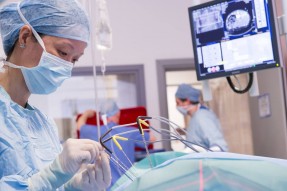On this page
Signs and symptoms
The signs and symptoms of kidney cancer can include:
- Blood in your urine
- A constant pain in your side, just below the ribs
- A lump or swelling in the kidney area (on either side of the body)
More information from the NHS
Diagnostic tests
There are a range of tests to diagnose kidney cancer and include:
- Ultrasound scan to examine the kidneys
- Guided biopsy is a procedure to take a sample of tissue from the kidney under ultrasound
Once the diagnosis is known then further information about the type of kidney cancer can be found by on the Macmillan website.
Treatments
The treatments for kidney cancer include:
- Surgery
- Drug therapy including targeted therapies and immunotherapies
- Tumour ablation including thermal ablative energy in our Cancer Centre
- Tumour embolisation
When treatment is complete
When treatment is complete a member of the team will discuss what happens next.
The Kidney Cancer Nurse Specialists are available for advice and can be contacted on 0113 2067692.
Thermal Ablative Energy at Leeds
The use of thermal ablative energy – the ‘heat and ice’ – has gradually been replacing surgery for smaller cancers and provides huge benefits to patients. The intervention destroys tumours in a minimally invasive procedure performed under image guidance. This enables tumours to be treated without harming the remainder of the organ.

Dr Tze Wah, Consultant Radiologist at Leeds Teaching Hospitals, is one of only two consultants in England with extensive experience to perform this leading edge treatment on kidneys.
The IO programme in Leeds, led by Dr Wah, has performed treatments on renal tumours in hundreds of patients using both hot and cold energy and has an overall technical success rate of over 95%. This is comparable to the gold standard surgical approach.
Leeds Teaching Hospitals is a specialist centre for this treatment for the North of England and nationally. Some patients have travelled from as far away as Barbados and Singapore for treatment in Leeds. Dr Wah has also been providing advice and working with the National Cancer Centre (NCC) in Singapore to help them set up IO ahead of the launch of their new cancer centre in 2018.
Patients spend a lot less time in hospital following this procedure than they would after conventional surgery. This is more cost effective for the hospitals but, most importantly, recovery times for patients are dramatically reduced.
Support and contact information
The Kidney Cancer Nurse Specialist Team
The team has expertise and experience in assisting with patients and carers concerns including:
- Information about the disease illness, investigations, treatments and follow up
- Advice about any symptoms;
- Support for patients, relatives and carers;
- Referral to the community nursing teams, such as the District Nurses;
- Referral to other professionals who can offer specialist advice such as benefits, social services or complimentary therapies.
The advice line number is 0113 2067692.
Kidney Cancer UK is the UK’s leading specialist kidney cancer charity who provide information and support for patients, carers and their families. Kidney Cancer UK also have a dedicated support line where you can speak to others who have gone through similar experiences. There is also the Kidney Cancer Forum where you can share your experiences, or seek support and advice online.
Tel: 0800 002 9002
The Kidney Cancer Support Network is a patient-led network of kidney cancer patients, their carers and their families. The network was created to help kidney cancer patients come together to share experiences an insights to help improve the knowledge and awareness of kidney cancer.
Tel: 0800 121 8721
Macmillan Cancer Support improves the lives of people affected by cancer. They provide practical, medical and financial support and push for better cancer care. They provide booklets on cancer and treatments and run helplines providing cancer information and benefits advice as well as an interactive online community forum.
Tel: 0808 808 0000
Maggie’s Centres are drop-in centres located around the country where they can offer practical, emotional and social support to people with cancer and their families and friends. They also have the Maggie’s Online Centre, where people can communicate and share experiences with other people who have been affected by cancer.
Tel: 0300 123 1801
Email: [email protected]
Marie Curie provide care and support for people living with any terminal illness, whilst also supporting carers and family members. Marie Curie also provide information on practical support which is available to view online or accessible through their helpline.
Tel: 0800 090 2309
Cancer Research UK provide information online to view and download. They also have an online forum for patients and carers as well as a national helpline.
Tel: 0808 800 4040